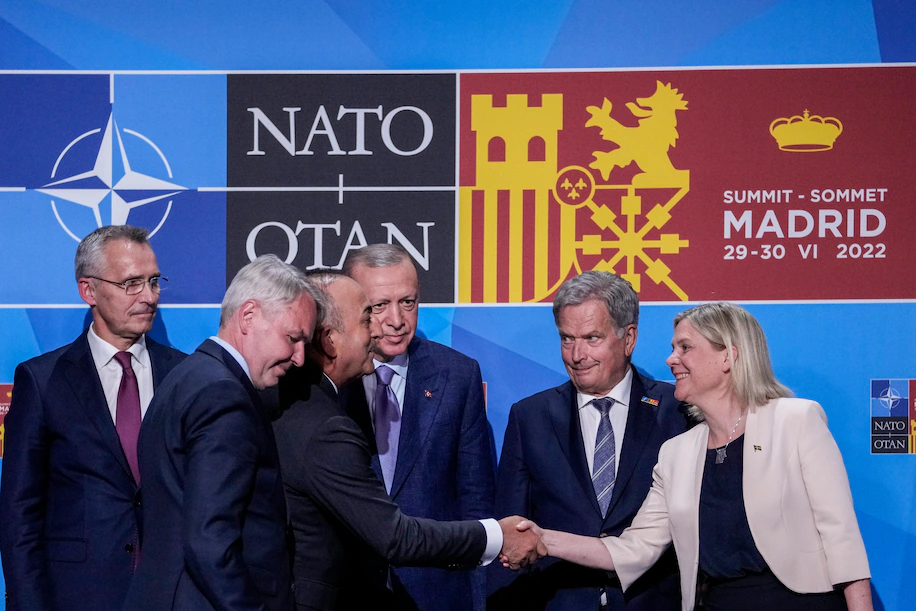
For Europe, Ukraine is the good war — a moment when brave Ukrainian patriots have partially rolled back a brutal Russian invasion and, in the process, reignited belief in the values of democracy and common defense.
As Ukrainian troops surged forward on the ground this week, European leaders who gathered at a conference here were heady with what many described as an impending Ukrainian triumph over Russian President Vladimir Putin and the lawless, autocratic system he represents.
The victory celebration is stirring but wildly premature. Many months of bloody fighting probably lie ahead, with the danger growing that Russia might use tactical nuclear weapons in an effort to stave off defeat. But politicians from across Europe seemed so galvanized by Ukraine’s recent battlefield success that many dismissed the dangers of Russian escalation and what could be a cold winter for an energy-short Europe.
We’ve been analyzing the war in Ukraine in military terms, but it also marks an extraordinary cultural shift for Europe. It was nearly two decades ago, amid bitter disagreements over the Iraq War, that Robert Kagan wrote that the differences over use of force had become so acute Americans seemed to be from Mars and Europeans from Venus.
Just three years ago, French President Emmanuel Macron pronounced that NATO was suffering “brain death.” With President Donald Trump fulminating about NATO, too, the transatlantic alliance seemed to be collapsing on both sides of the ocean.
The war in Ukraine has largely reversed Europe’s phobia about the utility of military power — and the value of a strong alliance with the United States. To be sure, Europeans are wrapping themselves more in Ukraine’s blue and yellow flag than the red, white and blue. But it marks an enormous shift, not least because it’s shared by younger Europeans who have little memory of the Cold War but are repelled by the brutality of Putin’s authoritarian regime.
“Europe and the U.S. are closer than ever before,” said German Foreign Minister Annalena Baerbock this week at the Warsaw Security Forum, expressing a view shared by many of the other speakers. “We were a bit late at the beginning of the war, but we shifted our course by 180 degrees when it comes to supporting Ukraine.” (The conference was co-sponsored by the German Marshall Fund, of which I’m a trustee.)
Just a year ago, Germany seemed to be betting that its economic security required good relations with Moscow and a steady flow of Russian energy. That benevolent attitude toward Russia has been shattered. “What we have seen now is the return of America as the essential factor in European security,” said Norbert Röttgen, a prominent German center-right politician who until last year chaired the foreign affairs committee of the German parliament.
The Warsaw gathering symbolized another reality of the new Europe: NATO’s center of gravity has moved east, toward Poland and the Baltic States, which are historic enemies of Russian power.
Polish President Andrzej Duda told a small gathering at the Belvedere Palace on Tuesday night that Ukraine’s defiant stand reminded him of how the Polish army stopped the Russian Bolshevik army’s expansion west in 1919 and, in his words, changed the history of Europe. Outside the palace where he spoke stands an iconic statue of the general who commanded that Polish army, Marshal Józef Piłsudski.
These deep historical passions have been reignited by the war in Ukraine — and there’s a danger in seeing Russia exclusively through Polish or the Baltics’ eyes. But it’s clear that, as Czech Foreign Minister Jan Lipavsky told the conference, “Central and Eastern Europe have a kind of leadership” in the war against Putin.
But at the same time, NATO’s gravitational center has also moved north, too, toward Finland and Sweden, two traditionally neutral nations that were so shocked by Putin’s invasion that they applied to join the alliance. As Anna Wieslander, who heads the Stockholm Atlantic Council Office, reminded the group, the last time Sweden joined a European alliance was in Napoleon’s time, more than 200 years ago.
The most surprising theme of this gathering was the dismissal of Putin’s nuclear threats. Polish Prime Minister Mateusz Morawiecki said the saber-rattling was just “an attempt to frighten us.” Tactical nuclear weapons “will gain nothing militarily,” agreed Lithuania’s former foreign and defense minister Linas Linkevicius. Adm. Rob Bauer, a Norwegian who chairs the NATO military committee, said that despite Russian nuclear threats, “strategically, they have lost the war already.”
When triumphal talk is in the air, it pays to be skeptical. Wars don’t end easily or neatly. But the changes that the Ukraine conflict brought to the European mood seem real, and they could last for decades.
